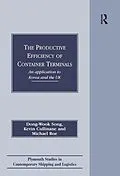Using Korean and UK ports as comparative case studies, this volume provides a systematic and pragmatic analytical framework to assess the process and results of privatization in the context of ports and terminals. It develops a new economic model to measure the efficiency of ports and to assess the policy implications.
Autorentext
Dong-Wook Song, Kevin Cullinane, Michael Roe
Zusammenfassung
This work applies the theory and techniques of economic efficiency measurement to the realistic context of the ports industry. The objective is to assess the practical impact of port privatization policies upon the economic performance of the sector. Specifically, this volume presents Korea's port and terminal development plans and systematically analyses not only the process and results of privatisation, but also the claims of its proponents that it leads directly to improved efficiency. The Korean experience is given global relevance by applying the same approach to Britain's main container ports and terminals which, of course, are at a more advanced stage in the privatisation process. This work constitutes a unique contribution to the literature relating to shipping and ports, econometrics and the Korean economy and will be of primary interest to port authorities and practitioners, as well as to students of economics and/or the shipping industry.
Inhalt
Contents: Introduction; An overview of the Korean national economy; The Korean port industry; Privatization theory and evidence; Port privatization: theory and practice; A theoretical framework for efficiency measurement; Productive efficiency of container terminals: an empirical investigation; Discussion, policy implications and conclusions; Bibliography; Appendices.
Titel
The Productive Efficiency of Container Terminals
Untertitel
An Application to Korea and the UK
EAN
9781351883528
ISBN
978-1-351-88352-8
Format
E-Book (pdf)
Hersteller
Herausgeber
Genre
Veröffentlichung
05.07.2017
Digitaler Kopierschutz
Adobe-DRM
Dateigrösse
21.75 MB
Anzahl Seiten
258
Jahr
2017
Untertitel
Englisch
Unerwartete Verzögerung
Ups, ein Fehler ist aufgetreten. Bitte versuchen Sie es später noch einmal.
